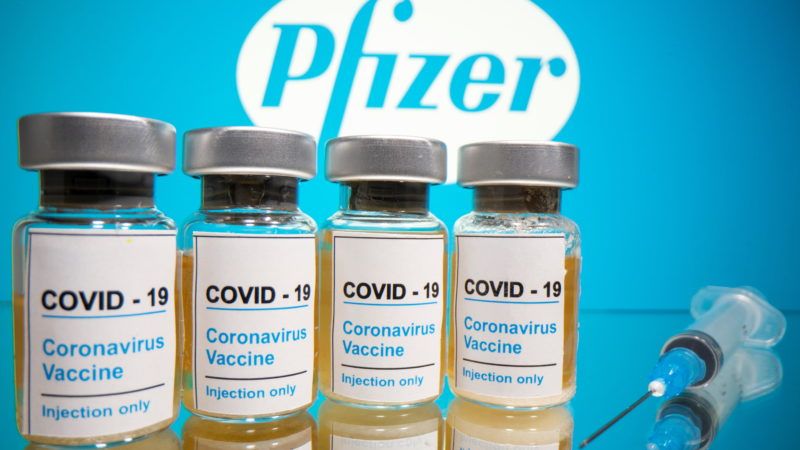Pfizer/BioNTech COVID-19 Vaccine Is 90% Effective
And there looks to be more good vaccine news coming.

We have preliminary results from a randomized control trial of a COVID-19 vaccine developed jointly by the pharmaceutical companies Pfizer and BioNTech. The news is good: The vaccine appears to be 90 percent effective in preventing infections caused by the coronavirus.
This is especially welcome news right now, since diagnosed cases are accelerating in many countries around the world, including the United States and most of Europe. The vaccine requires two doses and becomes effective 7 days after the second injection, according to the companies. The Data Monitoring Committee overseeing the trial has not reported any serious safety concerns.
The Food and Drug Administration (FDA) has required the companies to follow trial participants for two months to collect further data on the safety of the vaccines. Pfizer and BioNTech report that additional safety data will be available by the third week of November. If all is well, the companies will seek an Emergency Use Authorization from the FDA, enabling them to deploy the vaccine before the end of the year. The companies project that they can produce up to 50 million vaccine doses globally in 2020 (enough to treat 25 million people) and up to 1.3 billion doses in 2021 (enough to treat 650 million people).
The Pfizer/BioNTech vaccine involves a synthetic version of the messenger RNA (mRNA) that the coronavirus uses to construct the proteins that let it infect human cells. The injected mRNA tricks the body into making some of the viral proteins that then induce the immune system to produce antibodies in response. Antibodies bind themselves onto attacking viruses and bacteria, disabling them or marking them for death by other parts of the immune system, like the cell-devouring macrophages.
Moderna is another company using mRNA vaccine technology. The Jerusalem Post reports that the company expects to release the clinical trial results of its two-dose vaccine in early December. If the results are positive, the company says it can produce 20 million doses by the end of the year and between 500 million and 1 billion in 2021.
If these results stand the test of time, the development of the mRNA vaccine platform is really good news for humanity in the long term. This platform makes it much easier to devise new vaccines and much faster to scale up their production.
The mRNA platform is not the only contender in the global race to create and deploy a coronavirus vaccine. The global pharmaceutical giant AstraZeneca expects to report its vaccine clinical trial results before the end of the year. AstraZeneca bases its single-dose vaccine on a chimpanzee cold virus modified to express COVID-19 viral proteins. Its clinical trials were halted briefly so that researchers could investigate a couple of instances in which clinical trial participants experienced concerning medical conditions. CEO Pascal Soriot says that the halt has delayed the deployment of the vaccine but, assuming its safety and efficacy are proved, the company expects to deliver hundreds of millions of doses of its vaccine in 2021.
The Trump administration's Operation Warp Speed, through which the federal government loosened regulatory rules and speculatively awarded billions of dollars to vaccine makers, deserves a lot of the credit for the amazing speed with which COVID-19 vaccines are being developed and rolled out. It is worth noting that Pfizer did not accept federal funding for the research and development of its mRNA COVID-19 vaccine, although the company did sign a $1.95 billion contract with the federal government to manufacture the vaccine.

Show Comments (159)